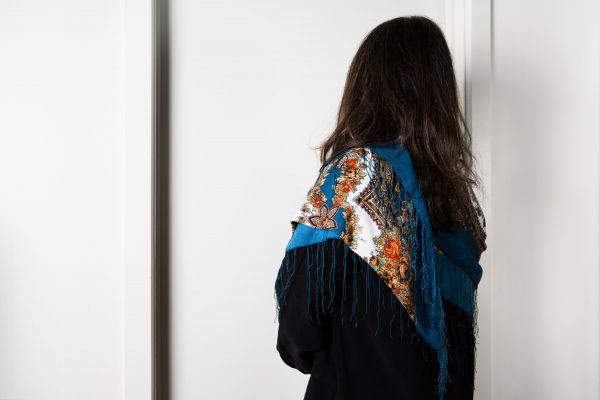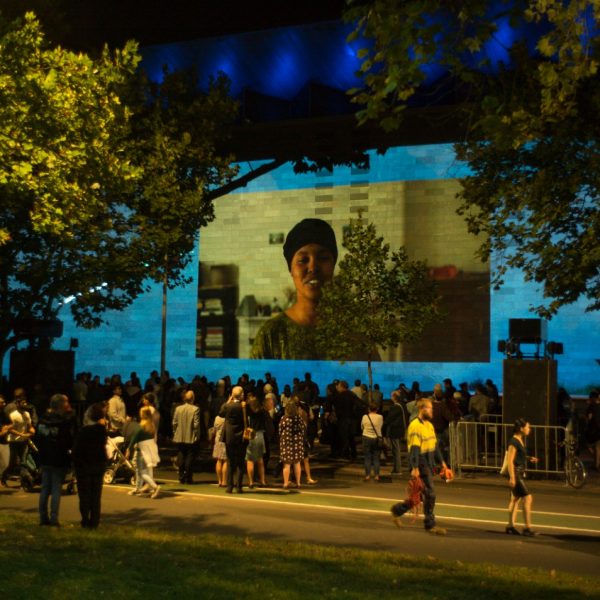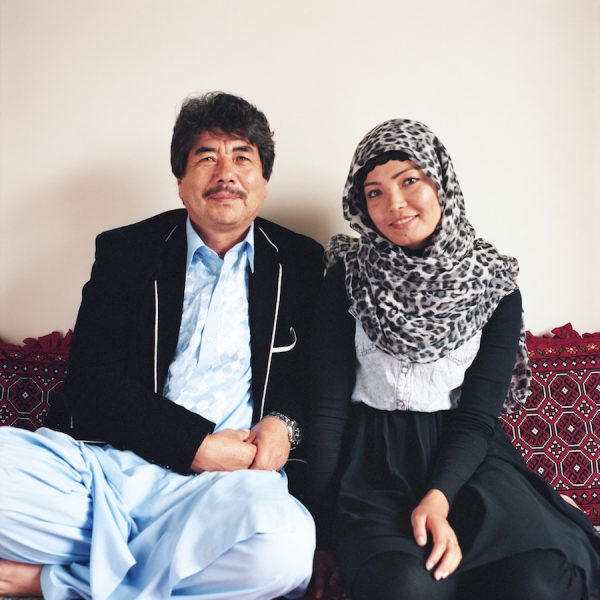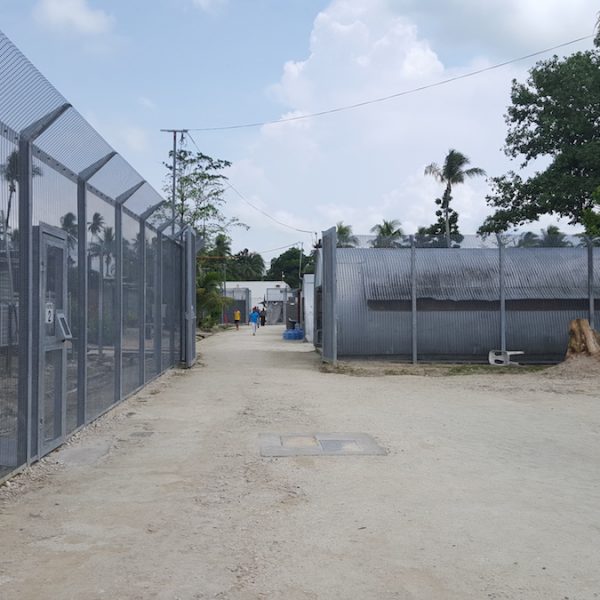
Sara lived in Iran with her husband and sons. She worked as a translator and interpreter. The Iranian government placed limits on freedom of expression and clamped down on writers and thinkers who were considered anti-authoritarian or operating against Islamic rules. This was why Sara didn’t want to live in Iran anymore.
Now, Sara lives in the northern suburbs of Melbourne. Although she’s on a bridging visa that doesn’t allow paid work, she stays busy volunteering for a variety of community and religious organisations. Middle-aged and short in stature, Sara’s never seen without makeup and gold jewellery. She’s polite and kindly, calling everyone ‘dear’ and always willing to have a conversation. She arrived early to tell us about her time in detention, saying she had to attend an Iranian community meeting afterwards.
I’M COMPARING MY LIFE TO THAT OF A DEAD PERSON
I left in June 2013 and flew to Malaysia and Indonesia. I came here by boat. After eleven days on the ocean we were picked up by the Australian navy and brought directly to the Darwin. The very first moment we were in Australia they told us they might send us to some other place but didn’t mention anything about what particular place.
When we arrived at the detention centre it was like heaven. I felt I’m in a very safe place. This is the reason I’m saying the camp was not that bad – I’m comparing my life to that of a dead person.
12 days after [we joined the camp], they started this rule of sending newly arrived asylum seekers to places other than Australia. Everybody in camp was worried about it, like we still are, about this unclear future.
SPECIAL FAVOURS
The camp was very clean. The services were good. The whole place was open but, for example, if you wanted to eat there were certain times you could go to the restaurant. If you wanted the Internet there were certain times you could use the Internet. At certain times you could use the restaurant, the Internet café, the shop – things like that. There was only one shop. During each week they gave us some points. These points were like having money. If you passed courses, for example, if you went to each one of the classes like craft class or English class, they gave you two points. Each point was considered some amount of money. So, at the end of the week anyone who passed a course had some extra credit, including the main credit that everyone already had. You could go to the shop and buy toothpaste, chocolate, nuts, notebooks, pens, bags or makeup – very limited makeup items.
The rooms were small, I’m not very good with measuring, maybe five metres. There was a TV, a small fridge and air conditioning. There were bunk beds. We were three women per room with one bathroom, which we were sharing.
There were certain times that you had to be in your room. They [detention centre staff] were studying how many people were in the detention centre every night. You could go to your friend’s room as a guest but you couldn’t move to another room. My first room had no lock at all. I remember my glasses were lost. They gave me a new pair but not as good as my own. The eye test inside the detention wasn’t very sophisticated. If you wanted to be tested by a specialist, you had to write a request and they made an appointment for you in a hospital or somewhere. If you wanted a specialist for any kind of medical check, you had to write down a request and then they make an appointment and you’re transferred there.
After a few weeks we were moved to some other room. There was a lock [on the door]. My roommates were a mother and daughter. We still have a connection on Facebook. We telephone [each other], sometimes. They’re good people. But they used to watch TV until four or five o’clock in the morning. I couldn’t sleep and always had a headache in the morning. I couldn’t tell them, ‘don’t watch TV.’ They have their rights. So I wrote a request [to the staff] several times, ‘Please, I have a migraine. I have to sleep early. I cannot tell them to not watch TV, please move me to other room.’ But I didn’t get one.
I witnessed he was doing favours for very young and beautiful girls all the time. Not only him all of the security Share on XSome girls had private rooms. I witnessed that the security guards had relationships with young girls. For example, there was one day when it was very hot. My roommates had been out and I didn’t have the key. The security had some kind of key that can open it – a master key. One of the security guys was passing and I asked him, ‘Can you please open the door?’
He didn’t! He said, ‘Wait here for your friends to come.’ He knew me but he didn’t open the door. I had to stay out in very hot weather. But I witnessed he was doing favours for very young and beautiful girls all the time. Not only him, all of the security…I can’t say all – most of them, had relationships with young girls. As I came out of the detention centre one of these girls told me the guy she had a relationship with always let her use the computer or internet at midnight – until morning. Of course they [the girls] are satisfied with it too. I cannot blame only the security.
EATING POTATOES
Breakfast was always good because it was something that everyone could eat. Butter, jam, cheese, eggs and everything. But lunch and dinner, I witnessed that many people were not eating. It was not the kind of food we are culturally used to. We didn’t expect [the cooks] to follow our culture or tradition but sometimes the food was too spicy. For the last two weeks I only had potatoes. I remember we were sitting at a table together, all having potatoes. And right now, when I’m with my friends and we eat potatoes we make fun of those days: ‘Ah, remember camp? We all had potatoes all the time.’ We’re grown up, adults, we could take care of ourselves, but I remember the kids were not eating at all. We didn’t expect them to give us a menu. But at least they could have considered the children. Many of the parents asked me to write down a complaint. I did that several times. I also spoke to one of the Sercos [Serco employees who staffed the detention centre] one day. I was writing a complaint for the parents and he came to me. I described it to him: ‘Parents are not happy with the food. Kids are not eating.’
He said, ‘You can’t expect us to provide whatever you want.’
I said, ‘No, but at least pay attention to the children’s nutrition. They are not eating at all. They have lost weight.’
We make fun of those days: ‘Ah, remember camp? We all had potatoes all the time.’ Share on XThere is a form – a request form or complaint form. If you’re lucky enough to [be able to] write in English you write a complaint. These complaints might be considered. Most of the people wrote it down in their own language. If they wrote in their language there was another process: it went to an interpreter and the interpreter had to translate all of them. People used to write in Persian and that used to take longer.
That was one of the jobs I did. Writing different complaints or requests [in English]. Some wanted to go to the medical centre. Some wanted to go to the shop and there was no interpreter in the shop. One of the girls didn’t feel good so they called ambulance and there was no interpreter at midnight so they asked me to be with her.
There was one woman who had a handicapped child. One day she came to me. She said she wrote down several requests asking her child to be taken to the hospital because the child was diagnosed with epilepsy. The child didn’t feel good. She took it to the doctor, to the nurse – no use. So I went directly to the CEO of the detention centre. She had arranged a meeting for everyone, to tell them some more rules. Other people said to me, ‘No, it’s not good. Don’t make a complaint to the CEO, they’re gonna keep you in the camp forever.’
I said, ‘It’s okay.’ I didn’t know where this courage came for me. I went to her. I said, ‘I have a complaint. I want to give it directly to you.’ Exactly two or three hours after that, the child and mother were taken to the hospital.
I remember from that day all the security people stepped behind me. And the one I told you about – the one who didn’t let me into my room – he came back and said, ‘Please forgive me, I didn’t open the door for you. You went to the CEO.’ He thought I was going to complain about him. I was not going to complain about him. All I was concerned about were this child and his mother.
CLOTHES ON OUR BACKS
I remember in the morning it was cold. I asked them several times in the morning, ‘It’s very cold, we need a jacket – all of us.’ I never received a jacket. They only gave me plastic slippers. I wrote down several complaints because my shoes were broken and some parts of my feet had scars.
There were many people who were asking [for clothes] – all the people in detention centre. I only had two dresses and one of them was a nightdress. The other was a t-shirt. I saved it. When I look at it, it reminds me of the detention centre.
There were some times they gave dresses to people who wrote down requests several times. There was a girl with her husband and child. She wrote down several requests and they gave her a dress but the dress was very loose. Her husband went to the Serco and said, ‘please change that dress’ but they didn’t. So the only thing he did – he threw away the dress. Just threw the dress away and said, ‘I don’t want it! I wrote down several requests and the dress is very loose. It’s not my wife’s size. It’s no use!’
She had only one dress. I had two and she had only one. Imagine if she washed the dress she had to stay in her room until the dress got dry. No one was considering this. He just lost his temper for a moment and they [the guards] were going to separate him from the family and take him to another place. We knew when they separate someone from the family it takes long time for them to be together again. I went to the master Serco and asked him ‘Can you please forgive him. He was just upset.’
He [the master Serco] took them to the room and talked to them and said, ‘I’ll ignore it this time.’ He gave them a long speech, about one hour or more, and I interpreted for them and he was so nice to forgive them for what happened.
One day in the morning I went to have breakfast and I saw some names on the table and the security people said, ‘This is your appointment with the detention centre.’ They didn’t tell us we’re going to be released but because I had heard when you have an appointment with detention centre they are looking over your file so you can be released to the community. I ran to my room and screamed, ‘Wake up, wake up, immigration is here. They are going to release us to the community soon.’
I called one of my friends in Sydney and asked him, ‘There is some process happening. Are they going to release us?’
He said, ‘Yes, this is the process.’
We were all happy. We were gathered in a big venue where they gave us information – what is the process, what is the level of our visa, what the visa means. We were so happy we didn’t pay attention. We just wanted to be released to the community.
There was a family of three who asked for slippers several times. That was the time they gave them slippers. When we were about to be boarded from the bus to the airport. I left the detention centre in a nightdress. I got on the airplane in a nightdress. It was very embarrassing! Have you seen anyone get on the plane in a nightdress? I was released to Sydney, and then I came to Melbourne.
For forty-five days I was in a detention centre. I think the best thing I did was helping people. Share on XSome of my friends who were coming directly to Melbourne were leaving in winter. They left the detention centre in shorts. I heard they all caught colds. It was winter and they didn’t have dresses. Right now, as you know, I help asylum seekers by providing them dresses. I took hundred of bags to Mita detention centre. Last time we went there they said, ‘We don’t need dresses anymore.’
For forty-five days I was in a detention centre. I think the best thing I did was helping people. I loved it. I thank God for it. I ask God to give me strength, all through my life – and this is what I like to do.
Sara told her story to Rajith Savanadasa.
Photograph © Emily Bartlett Photography


